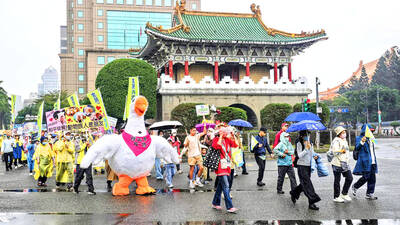The government holding a referendum that complies with the Referendum Act (公民投票法) is either a political ploy or a prank on the people, former Democratic Progressive Party (DPP) chairman Lin I-hsiung (林義雄) wrote in an article about the Cabinet’s initiative to hold a referendum on the construction of the Fourth Nuclear Power Plant in New Taipei City’s (新北市) Gongliao District (貢寮).
“Unfortunately, the Executive Yuan’s referendum proposal was full of political calculations. It was a cheap trick and a prank that plays the public for fools,” wrote Lin, who has been a staunch anti-nuclear power activist for the past two decades.
The article was published late on Friday on the Web site of former DPP chairwoman Tsai Ing-wen’s (蔡英文) Thinking Taiwan Foundation.
The Referendum Act, which was enacted in 2003, laid down “unreasonable and strict” regulations that made the passage of referendums “almost impossible,” he said.
The act requires that a referendum have an electorate turnout of at least 50 percent and be approved by 51 percent of voters to be valid, stipulations that have been described as a “double 50 percent shield.”
These restrictions are why only the president, the KMT and the DPP have been able to submit a referendum proposal over the past decade and also why none of these proposals have passed, he added.
Lin said that what the Executive Yuan should do is immediately suspend construction of the power plant, or, at the very least, have the integrity to phrase the referendum so it asks the people if they support the plant’s construction, instead of its suspension.
The Executive Yuan is obviously trying to take advantage of the act’s restrictions by making the position it does not support the question it puts to the people, knowing that the referendum will likely fail, the DPP heavyweight said.
“It is unnecessary for the Executive Yuan to ask the people if they support suspending the project since the Executive Yuan has no intention of stopping the construction,” Lin said.
It is “common sense” that Taiwan would not able to withstand a nuclear disaster like the one at the Fukushima Dai-ichi nuclear power plant in Japan in 2011, the former DPP chairman said.

NUMBERS IMBALANCE: More than 4 million Taiwanese have visited China this year, while only about half a million Chinese have visited here Beijing has yet to respond to Taiwan’s requests for negotiation over matters related to the recovery of cross-strait tourism, the Tourism Administration said yesterday. Taiwan’s tourism authority issued the statement after Chinese-language daily the China Times reported yesterday that the government’s policy of banning group tours to China does not stop Taiwanese from visiting the country. As of October, more than 4.2 million had traveled to China this year, exceeding last year. Beijing estimated the number of Taiwanese tourists in China could reach 4.5 million this year. By contrast, only 500,000 Chinese tourists are expected in Taiwan, the report said. The report

Temperatures are forecast to drop steadily as a continental cold air mass moves across Taiwan, with some areas also likely to see heavy rainfall, the Central Weather Administration (CWA) said. From today through early tomorrow, a cold air mass would keep temperatures low across central and northern Taiwan, and the eastern half of Taiwan proper, with isolated brief showers forecast along Keelung’s north coast, Taipei and New Taipei City’s mountainous areas and eastern Taiwan, it said. Lows of 11°C to 15°C are forecast in central and northern Taiwan, Yilan County, and the outlying Kinmen and Lienchiang (Matsu) counties, and 14°C to 17°C

STEERING FAILURE: The first boat of its class is experiencing teething issues as it readies for acceptance by the navy, according to a recent story about rudder failure The Hai Kun (海鯤), the nation’s first locally built submarine, allegedly suffered a total failure of stern hydraulic systems during the second round of sea acceptance trials on June 26, and sailors were forced to manually operate the X-rudder to turn the submarine and return to port, news Web site Mirror Daily reported yesterday. The report said that tugboats following the Hai Kun assisted the submarine in avoiding collisions with other ships due to the X-rudder malfunctioning. At the time of the report, the submarine had completed its trials and was scheduled to begin diving and surfacing tests in shallow areas. The X-rudder,

DEMAND: The government should enact regulations in line with Austria and Germany to incorporate vegan nutrition into school meals, an advocate said More than 1,000 people yesterday marched in Taipei to promote veganism, calling for legislation to incorporate vegan diets into school lunches and the national net zero emissions program. Participants gathered on Ketagalan Boulevard in front of the Presidential Office Building for the march, which was organized by the Vegan Action Network (VAN). Former ambassador to Chad Chiu Chung-jen (邱仲仁), actor Yankee Yang (楊子儀) and actress Cindy Lien (連俞涵) attended the event. VAN member Marianne Chao (趙梅君) said that the campaign aimed to urge the government to promote vegan diets across schools and government agencies via legislation and national policies, which would help build